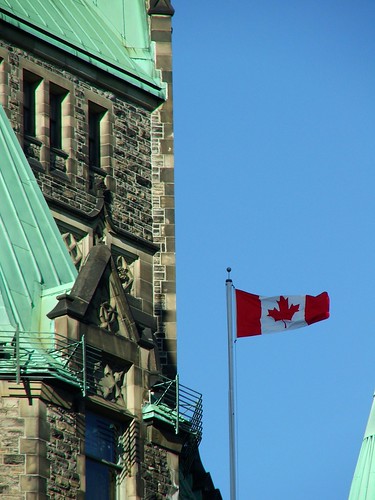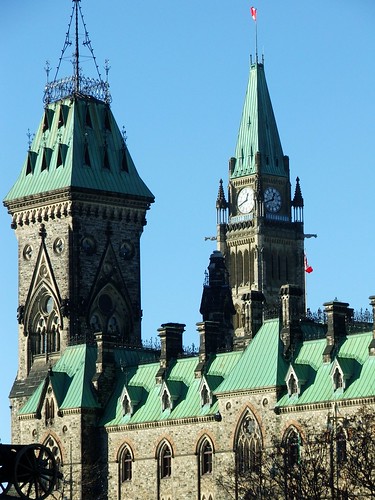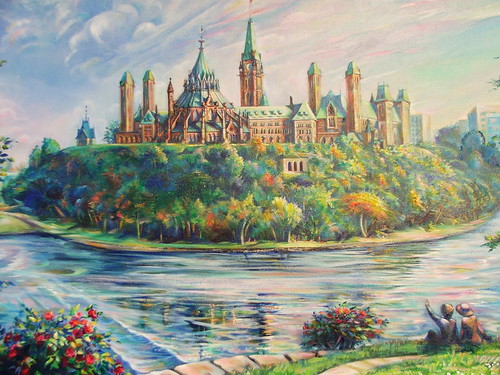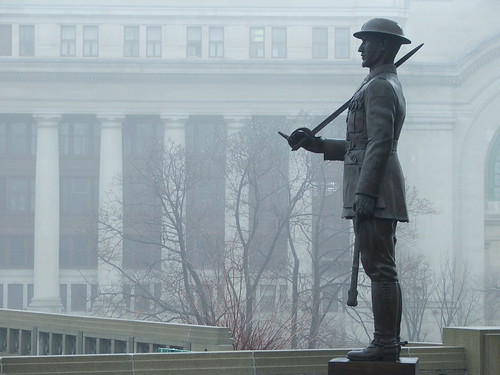Jul 01, 2003
In the days of the nation-wrenching referenda on the separation of Quebec half a generation ago, many federalists adopted the slogan, "My Canada includes Quebec."
As a slogan, it wasn't particularly effective. But it captured two essential features of the new Canada we are just beginning to see: the idea of ownership, in the sense that what this nation is becoming belongs to us, is even a part of us; and the idea of inclusion, a recognition that while the Quebecois may dress funny, speak funny, and are, even, a nation unto themselves, their loss would diminish what we have been building together.
Happily, the majority of Quebecois agreed, and so this nation remains a part of the larger political entity, and so we as a whole were able to continue in this noble project of redefining ourselves as a country.
 What we are seeing today is the beginning of the fruits of our labour. We set out to build a nation based not on a particular language or culture or even a particular geography, but as a set of background assumptions and institutions. Our national character is defined not by some fundamental founding document and predefined identity but rather by the institutions and measures we take in order to ensure well-being and harmony among our people.
What we are seeing today is the beginning of the fruits of our labour. We set out to build a nation based not on a particular language or culture or even a particular geography, but as a set of background assumptions and institutions. Our national character is defined not by some fundamental founding document and predefined identity but rather by the institutions and measures we take in order to ensure well-being and harmony among our people.
To Canadians, especially young Canadians, as a recent Globe and Mail series observed, this new sense of identity is almost second nature. "They are the most deeply tolerant generation of adults produced in a nation known for tolerance," writes the Globe. "They live, as one young woman observed, what their parents had to learn."
Some commentators, such as a recent Washington Post article on our new-found identity, attribute our good fortune to luck. "America invented itself," writes the author. "Canada sort of happened."
But there is more than that, much more. If you look at the sort of things we have been able to accomplish over the last twenty years or so, it becomes evident that the Canada of today is the result of the dedication, sweat and sacrifice of millions of individuals.
Consider...
We provide the essentials of life, including health care, to every person in the country. When polled, Canadians routinely report universal health care as our crowning achievement, definitive of national identity. But it is more than that: social welfare is available in every province, unemployment insurance is available to every worker, and the Canada Pension Plan (or Quebec Pension Plan) ensures that our old can live in dignity.

Canadians are safe and secure in their own cities and towns. Think about it: it is possible for me to walk, without fear, through the streets of Canada's largest city, a population of 4 million, in safety. Canada has accomplished this through firm but gentle policing (one t-shirt available at the border bears the slogan, "Canada: Land of Polite Police"), strict gun laws that keep their presence to a minimum despite a constant inflow from south of the broder, the abolition of the death penalty, and more.
Canada's legal system benefits from a fair and tolerant legal regime. Much has been made of our recent flirtation with the legalization of marijuana and our outright legalization of gay marriage. But these are the end results of a system of legislation and enforcement which, in recognition of prevailing (though still minority) trends in the country, has come gradually to reflect our diversity.
Even twenty years ago, the simple possession of marijuana was not strictly enforced and warranted only small fines. Being gay or lesbian has been legal for as long as I can remember. Gay pride parades are an occasion for celebration, and often include the mayor and other politicians. The Marijuana Party - which advocates the legalization of marijuana - is a legal (though fringe) political party and its B.C. leader, Marc Emery, smoked pot on the front steps of the Toronto police station last week.
But we have gone beyond mere social security and safety. We have, as numerous commentators have reported, embraced the idea that we are a multicultural country. This is something that goes well beyond mere tolerance: it is something that we encourage and celebrate. Alberta, for example, has a reputation of being right-wing and intolerant. But in the capital, Edmonton, the annual Heritage Festival attracts more than 6,000 volunteers, 50 cultural pavilions, and 350,000 visitors - in a city of 900,000.
I could go on - I could talk about Canada's Charter of Rights and Freedoms, I could talk about Canada's contribution to the world in the form of peace-keeping, human rights overservers, mine sweepers, doctors and health care workers, and more. I could talk about our advances in science and technology - we were the third country to launch a satellite, we have the world's highest free-standing structure, we have the world's fastest (by far) internet. I could talk about how Canadians have contributed to the world of culture and literature.
Or I could talk about myself. I could talk about how, as a child, I was taught that Canada resembles a "salad bowl," in which each ingredient maintains its distinctiveness and yet contributes to the whole. I could talk about growing up in an environments where my parents and teachers asked me to please not fight with the French and with the Catholics (diversity was something different then). I could talk about being poor, living on Canada's welfare system, and slowly, determinedly, taking a tentative foothold on each rung this caring society offered me to make something more of myself. I could talk about being a long-hair all my life, being a radical, being, at times, very angry, and yet still obtaining employment, still sitting on committees and boards, still being respected on the basis of my opinions and my contributions to society.
We, as a nation, have evolved slowly. In contrast to the American dictum of "life, liberty and the pursuit of happiness," we have (informally, in a typically Canadian way) adopted the slogan, "peace, order and good government." Such an objective is not built with sweeping reforms and grand principles, it is built, a piece at a time, on a framework of institutions and associations. But if I had to identify the keys that make such a society possible, I would narrow down to two major things: the elimination of need, and the empowerment of the individual.
In his important work, The Struggle for Democracy, Patrick Watson clearly delineated the relationship between wealth and governance. It is not possible to exercise one's rights or civil liberties while at the same time in a state of poverty and need. The more one's sustinance is dependent on conformity with to some established order, the less one is likley to be able to take into one's own hands the means to challenge that order. Democracy requires a certain level of prosperity in each of its citizens.
There has been much discussion in my field about the means to best provide an education to the disadvantaged people of the nation and of the world. How astonishing that the single, most basic, most effective means is so often overlooked: feed them. Learning, progress, empowerment - none of these are possible in a system where one's basic well being is under seige.
The second major principle is the empowerment of the individual. This includes - but of course is not restricted to - their enfranchisement. It was a long struggle in Canada to grant all adults the vote, and it is an even longer struggle to grant to them access to those institutions that would allow them to make a difference. The Globe and Mail notes that young Canadians are abandoning the ballot in droves: but it notes (though only in passing) that they are instead taking the management of their community and country directly into their own hands.
The empowerment of the indvidual is not accomplished externally. It is not something that can be given to you: you have to obtain it for yourself. In the last twenty years, we have seen this principle demonstrated ona global scale: the people of the Philippines, of Korea, of Eastern Europe, of Argentina and Brazil, have shown us that liberation comes from within. The sad experiences of Haiti, Somalia, and more recently, Afghanistan and Iraq, show that it cannot be purchased from without.
In the individual and communitarian sense, the empowerment of the individual means giving that individual the space (and the means - see the first principle) to find, and express, their own identity, to realize their own potential. What we have seen in this nation is that people find their identity in a myriad of ways, some, by preserving and promoting their culture, others, by the free expression of thought and empotion in literature, art or song, others, through an affinity with a higher power, with their ancestors, or with the natural world, and still others by souping up, jacking and racing a Camero.
 This is our Canada, a project still not complete - so far from complete - but a magnificant achievement that is a testament, a living legacy, to the dreams and aspirations of so many who have gone before.
This is our Canada, a project still not complete - so far from complete - but a magnificant achievement that is a testament, a living legacy, to the dreams and aspirations of so many who have gone before.
This - after all - was not an accident. It was planned, a very deliberate, not fully formed but idealistic vision of what life in a paradise could be like if we would only begin to live the dream toward which we aspired. It is the nation that took former Prime Minister's Pierre Trudeau's comment, "The state has no place in the bedrooms of the nation," quite seriously, quite literally, and which saw the next generation of sexual orientation activists work - and live - in a manner befitting that ideal.
It is a nation in which, in the mid-1980s, I came to be employed by the Arusha Centre, a development education centre, in Calgary. Over two years with Arusha and the Development Education Coordinating Council of Alberta (the layers of committees and organizations is typical - governance being as important as outcome), I was exposed to the Hedleys, who had worked as teachers for two years in Brazil, to activists returning from construction tours in Nicaragua, to Philippine immigrants trying to organize a community beauty pageant, to the Chilean exile community, to Salvadoran guitarists, and most of all, to hundreds of ordinary bread-and-butter Canadians working with these communities, trying to understand their needs, and helping them to join Canadian society or return home, whichever they preferred.
It is a nation in which the national student press, CUP, did 20 years ago (and still does) promote itself as an agent of social change. The debate was never about whether our society should be improved, nor even about whether it should be a more diverse, more caring, and more supportive society, but rather, of how this was to be achieved and what role the press - student and mainstream - should play in that effort. Former CUPpies have scattered through society, the years of effort expended in such discussions being reaped a generation later in a harvest of enlightened leadership.
Over the years, as I have lived and worked in five provinces of this great country, and have travelled through the other five (and a territory), I have met not hundreds but thousands upon thousands of people, working in their own niche, serving on volunteer committees, staffing booths and telephone lines, donating their money, working for NGOs instead of corporations, working as a fifth column within corporations, sacrificing, sweating, but most of all living heart and mind in the Canada we now see ascendant.
And it is working. Our young people "are pursuing democracy in the workplace and in marriage. They are a global generation, committed to issues of tolerance and social justice.
"And always keep this in mind about them, because it is the generation's most significant characteristic: They are not a sudden sociological phenomenon; they are a generation whose values have evolved from those of the generations preceding them."
If you look on the streets, in the schools, in the community centres and beyond, in the forests, in Katimivik, you will see this younger generation building something even greater. A few days ago, for example, I read of two young students at Mount Allison University who, as their summer employment, obtained a grant and some funding and established a community garden in the town of Sackville. Their garden, explained the students, wasn't just about organic gardening - though it was partially about that. It was about community involvement and organization.
In the dressing room of the Montreal Canadiens, a hockey franchise storied with glory and tradition, a placard on the dressing room wall reads, "NNos bras meurtris vous tendent le flambeau, a vous toujours de le porter bien haut." And as is the custom, the translation: "To you with failing hands we throw the torch. Be yours to hold it high." It is, of course, a line from the poem, In Flanders Fields, by John McCrae. It is a poem, and an idea, that resonates with Canadians, signifying not only the sacrifice Canadians have made, but the reasons why they made it.
Last week, I had the privilege of listening to former general Romeo Dallaire describe the horror faced by and witnessed by Canadian peacekeepers as the slaughter of 800,000 people broke out and as the intervening forces withnessed, and were shot at, by child soldiers using today's lightweight automatic rifles. Do you shoot children? Or do you allow them to, one by one, kill the civilians you are trying to protect? "The sergent remembers clearly - digitally clearly - the moment he gave the order," recalled Dallaire. "The soldier remembers clearly - digitally clearly - pulling on the trigger, the cartridge flying up in an arc, the child's head exploding..."
I want you to understand this. I want you to understand not only the glorious side of Canada's new revolution, a quiet revolution that began on the battlefields of Europe, carried forward in the church basements of Saskatchewan and the student press of Quebec. I want you to understand that there have been casualties, civilian and military. I want you to understand that people - people like Dallaire, and many hundreds of thousands more - have dedicated their lives and paid the price for this, our new National Dream.

Sometimes the price is, as it has been for so many soldiers, one's life. Sometimes it is, as it was for Canadian doctor Norman Bethune, a lifetime in a foreign land. Sometimes it is, as was the case for Pierre Trudeau and so many others, the unrelenting call of civil service. And sometimes, as in the case of Dallaire and his troops, the price is paid in the knowing and the remembering.
I remember, in 1988, running for a couple of kilometers alongside the Olympic Torch as it passed through Edmonton on its way toward the Calgary games. As we made our way into Hawrelek Park, I was able to reach up, and place my fingertips along the side. I remember it being a light tan brown and a rough, carved surface. And I felt, from the torch into my self, the sense of belonging, of achievement, of idealism, pass.
My experience of the Canadian dream is much like that. I am close enough to touch it and into my life it breathes. I wrote, in an interview last year (and in my Personnel review at work), the following, which I have now posted on my web page:
"I want and visualize and aspire toward a system of society and learning where each person is able to rise to his or her fullest potential without social or financial encumberance, where they may express themselves fully and without reservation through art, writing, athletics, invention, or even through their avocations or lifestyle. Where they are able to form networks of meaningful and rewarding relationships with their peers, with people who share the same interests or hobbies, the same political or religious affiliations - or different interests or affiliations, as the case may be. This to me is a society where knowledge and learning are public goods, freely created and shared, not hoarded or withheld in order to extract wealth or influence. This is what I aspire toward, this is what I work toward."
Jeff Kerr once remarked, back in the halcyon days when I worked at Assiniboine Community College, pushing for online learning for their students and especially for those at Kerr's Brandon Adult Learning Center, that "You take such risks!" In the sheltered clime of organizational culture, perhaps. But when looked at alongside those of my compatriots, the risks I took - and still take - are nothing.
And yet still you might ask, you might wonder, why? Why this? And partly it's the deep sense of urgency prompted by the European wars, by the African wars, by the cries of the people in Ethiopia and East Timor. And partially its the example set by people like Pearson and Trudeau, Bethune and Banting (and so many more). But behind that, behind all of that, this:
I think back to the days when I still taught philosophy, when a student asked the inevitable question, "What is the meaning of life." And I thought about it for a while, and I thought about the time, a couple days earlier, I was walking through the streets of Strathcona, and I heard the children laughing in the nearby schoolground, the wind lightly rustling through the trees, the blue skies and the while clouds, and the perfect sense of harmony I felt at that moment.
And I think about the perfect days. Sliding through glassy moonlit waters over Lake Christie at Camp Opemikon, listening to the laughter of the loon through a spotless, starry night. Or sitting by the shores of Lake Superior on a sultry August afternoon, watching the storm clouds roll through the sunset on the horizon. Or just sharing my front porch with my cat, watching the neighbourhood go by, the sound of happy conversation wafting from Mountain Road, the robins foraging in my front lawn, the maple swaying gently overhead.
This, this is my Canada. My home. My love. My life. My dream.



